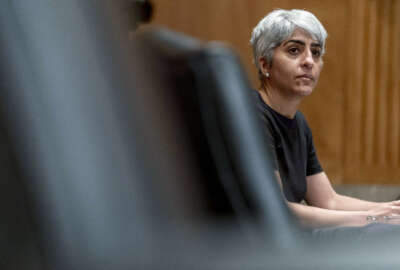

OPM’s Deputy Chief of Staff explained how highlighting remote work opportunities can encourage more diverse federal job applicants.
Best listening experience is on Chrome, Firefox or Safari. Subscribe to Federal Drive’s daily audio interviews on Apple Podcasts or PodcastOne.
Although many have said the youngest generation in the workforce heavily prefers more remote work and telework opportunities, the full picture is more complicated.
The future of those remote flexibilities looks a little different, after factoring in diversity, equity, inclusion and accessibility, said Khalilah Harris, the Office of Personnel Management’s new deputy chief of staff.
“When it comes to DEIA, we need to be conscious of the ways in which building your network allows for opportunity,” she said in an exclusive interview with Federal News Network on Aug. 23. “We are looking at expanding that conversation around the future of work, to talk about what the context is, and the quality of your work environment. Sometimes that does require you to go into a brick and mortar place, so you can meet people, have those cooler conversations, and those impromptu discussions where you really need to see someone’s body language in a way that you cannot online.”
Much of Harris’ work at OPM hinges on encouraging individuals from underserved communities to join the federal workforce. On Aug. 23, Harris spoke at the White House Initiative Latino Economic Summit in Atlanta, and called on Latinos and members of other diverse communities to look at opportunities to become part of the federal workforce. The economic summit is a White House effort to connect local Latino community members directly with federal leaders and resources.
“The rising leaders I spoke with today have unique perspectives, opinions and lived experiences that are invaluable contributions to public service. OPM is focused on building a federal workforce that draws from the full diversity of our country,” Harris said at the summit.
Although fostering in-person communication is important to federal DEIA efforts, so is highlighting remote opportunities to join the federal workforce, Harris added. To try to balance the scales, OPM is working to provide more thought leadership and training for agencies. The goal is to help agencies create structures that both allow for maximum telework, and ensure there are no unintentional gaps in equity when it comes to accessing federal jobs.
Some who live in underserved communities, for example, might lean toward remote job openings because they want to stay in their communities with their relatives, and with the values and culture that they’re familiar with, Harris said.
“Remote work is something that is important to many people, allowing them to stay in their communities, in rural communities and in communities that have fewer resources,” she told Federal News Network. “It does not make sense to pull people, who are anchors in those communities, out to go work in other places.”
That’s part of the reason why OPM is trying to expand remote work opportunities following the COVID-19 pandemic. On USAJobs — the federal government’s online database of job openings — OPM has added an advanced search option to filter for fully remote positions. That feature, Harris said, can directly support agencies’ DEIA efforts. Encouraging more applicants from underserved communities, in part, means meeting people where they are — in fact, 80% of the federal workforce works outside of Washington, D.C., she said.
“That’s not necessarily something people are clear about, that there are opportunities right in their own community to serve the federal workforce and serve the American public,” Harris said. “You can’t say that you want to recruit that type of workforce, and not go to where people are, and not make sure they understand what opportunities are available to them.”
Additionally, Harris said she’s focused on spreading the word about OPM’s pivot to focus more on skills-based hiring, rather than education. The agency released guidance to agencies in May, to help them re-frame their job postings to try to open the doors to more diverse applicants.
“When we think about the future of work, using a blanket bachelor’s degree requirement to determine who is able to do a job really has not been serving us well, and has been causing a lot more inequity,” she said. “If people can’t access college, but they obtained their skills through nontraditional routes, it has been very difficult for them to access jobs … in government.”
Especially as OPM is trying to quickly fill thousands of positions across the country under the Infrastructure Investment and Jobs Act, as well as the Inflation Reduction Act, Harris said the agency is trying to ensure DEIA is part of that entire process. But beyond hiring and recruitment, retention is the next step in ensuring a more diverse workforce for the long run. To try to encourage employees to stay in their positions for longer, OPM is looking to identify gaps in its data, create opportunities to upskill current employees and support employee resource groups.
And, particularly as you look higher up in the ranks of federal service, diversity in leadership positions diminishes, Harris said. To try to make those roles more inclusive and accessible, OPM is piloting several initiatives, including blind applications for senior roles and expanding opportunities to serve across multiple different agencies.
“Sometimes people will join an organization and not feel like there’s a pathway for them to get promoted,” Harris said. “But the federal government is partnering with a number of institutions, so that [federal employees] can improve their skill set, [and] obtain more senior roles if that’s their desire.”
Copyright © 2025 Federal News Network. All rights reserved. This website is not intended for users located within the European Economic Area.
Drew Friedman is a workforce, pay and benefits reporter for Federal News Network.
Follow @dfriedmanWFED


